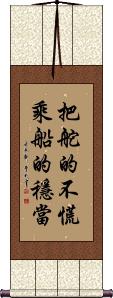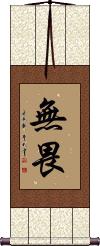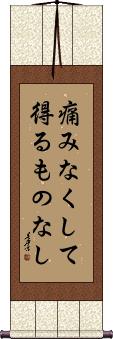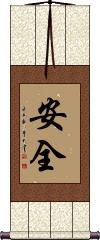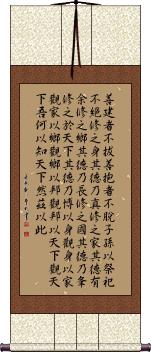Many custom options...
And formats...

Secure in Chinese / Japanese...
Buy a Secure calligraphy wall scroll here!
Personalize your custom “Secure” project by clicking the button next to your favorite “Secure” title below...
The Confident Helmsman Inspires Confidence in the Passengers
把舵的不慌乘船的稳当 is a Chinese proverb that literally translates as: [If the] helmsman is not nervous, the passengers [will feel] secure.
Figuratively, this means: If the leader appears confident, his/her followers will gain confidence also.
This is a great suggestion that a confident leader inspires confidence in his/her troops or followers. Of course, a nervous leader will create fear in troops or followers.
No Fear
(2 characters)
無畏 literally means “No Fear.” But perhaps not the most natural Chinese phrase (see our other “No Fear” phrase for a complete thought). However, this two-character version of “No Fear” seems to be a very popular way to translate this into Chinese when we checked Chinese Google.
Note: This also means “No Fear” in Japanese and Korean, but this character pair is not often used in Japan or Korea.
This term appears in various Chinese dictionaries with definitions like “without fear,” intrepidity, fearless, dauntless, and bold.
In the Buddhist context, this is a word derived from the word Abhaya, meaning: Fearless, dauntless, secure, nothing, and nobody to fear. Also, from vīra meaning: courageous, bold.
See Also: Never Give Up | No Worries | Undaunted | Bravery | Courage | Fear No Man
No Pain No Gain
痛みなくして得るものなし is a Japanese phrase that means “no pain, no gain.”
This suggests that with pain, a gain must follow.
The pain Kanji here can also be translated as sorrow or suffering. The gain can also mean profit, advantage, or benefit. In the Japanese Buddhist context, that gain Kanji can mean rebirth in paradise, entering nirvana.
The character breakdown:
痛みなく (itami naku) pain; ache; sore; grief; distress. The naku part adds the meaning of “a lot of” or “extended”
して (shite) and then. (indicates a causative expression; acts as a connective particle)
得る (eru) to get; to acquire; to obtain; to procure; to earn; to win; to gain; to secure; to attain.
もの (mono) conjunctive particle indicating a cause or reason.
なし (nashi) none of; -less; without; no.
Note: Because this selection contains some special Japanese Hiragana characters, it should be written by a Japanese calligrapher.
Safe / Secure
安全 is the word that represents the idea of safety and security in Chinese, Japanese Kanji, and old Korean Hanja.
Everyone wants to have some form of safety in their lives. This conveys how important the feeling of safety and security is to you.
Tiger Rumor
These four characters together relay the meaning that can be expressed in English as “When three people say there's a tiger running in the street, you believe it.”
Of course, there is an ancient story behind this idiom...
三人成虎 is actually a proverb that resulted from a conversation that occurred around 300 B.C.
The conversation was between the king of the Wei kingdom and one of the king's ministers named Pang Cong.
It was near the end of one of many wars, this time with the Zhao kingdom. Pang Cong was to be sent by the king to the Zhao kingdom with the king's son, who was to be held hostage. It was common at the time for a king to make his son a hostage to secure stable peace between warring kingdoms.
Before minister Pang Cong departed, he asked his king, “If one person told you a tiger was running in the street, would you believe it?.”
“No,” the king said.
The minister continued, “What if two people told you?”
The king replied, “Well, I would have my doubts but I might believe it.”
The minister continued, “So, what if three people told you that a tiger is running in the streets?”
The king replied, “Yes, I would believe it. It must be true if three people say it.”
The minister then reminded the king, “Your son and I are now traveling far away to live in the distant Zhao kingdom - much farther from your palace than the street. Rumors may fly about me in my absence, so I hope your majesty will weight such rumors appropriately.”
The king replied, “I have every trust in you, do not worry”
While the minister was gone, the king's enemies gossiped about minister Pang Cong on many occasions. At first, the king thought nothing of these comments and rumors. But slowly, as the rumors mounted, the king began to suspect ill of his minister.
Sometime later, when peace was well-established, the minister and prince were freed and returned to the kingdom of Wei. The king received his son BUT DID NOT EVEN SUMMON MINISTER PANG CONG TO THE PALACE!
Hopefully, this story will help you see how dangerous words can be when used to promote rumors or create ill will. And perhaps will inspire you not to believe everything you hear.
There is also a secondary suggestion in this idiom that gossip is as ferocious as a tiger. Some Chinese people who don't know the ancient story above may believe that this scroll means that rumors are as vicious as three tigers.
Note: This proverb appears in my Korean dictionary but is not well-known in Korea.
Daodejing / Tao Te Ching - Chapter 54
This is the Mawangdui version of Daodejing chapter 54.
By its virtue alone can one generation after another carry on the ancestral sacrifice.
Apply it to yourself, and by its power, you will be freed from dross.
Apply it to your household, and your household shall thereby have abundance.
Apply it to the village, and the village will be made secure.
Apply it to the kingdom, and the kingdom shall thereby be made to flourish.
Apply it to an empire, and the empire shall thereby be extended.
Therefore just as through oneself, one may contemplate Oneself;
So through the household one may contemplate the Household;
And through the village, one may contemplate the Village;
And through the kingdom, one may contemplate the Kingdom;
And through the empire, one may contemplate the Empire.
How do I know that the empire is so? By this.
What is firmly rooted cannot be pulled out;
What is tightly held in the arms will not slip loose;
Through this, the offering of sacrifice by descendants will never come to an end.
Cultivate it in your person, and its virtue will be genuine;
Cultivate it in the family, and its virtue will be more than sufficient;
Cultivate it in the hamlet, and its virtue will endure;
Cultivate it in the state, and its virtue will abound;
Cultivate it in the empire, and its virtue will be pervasive.
Hence look at the person through the person;
Look at the family through the family;
Look at the hamlet through the hamlet;
Look at the state through the state;
Look at the empire through the empire.
How do I know that the empire is like that?
By means of this.
These search terms might be related to Secure:
...And This Above All to Thine Own Self Be True
Changing Oneself / Self Reformation
Consciousness of Self
Dependable
Drain the Pond to Get All the Fish
Fall Down Seven Times, Get Up Eight
Fix the Roof Before the Rain; Dig the Well Before You Are Thirsty
Inner Strength / Self-Improvement
Introspection / Self-Awareness
Jiko No Kansei / Self-Completion
One Key Opens One Lock
Power of Oneself / Self-Sufficient
Prideful Mind / Self-Respecting Heart
Safe / Secure
Safe and Sound
Self Actualization
Self Awareness Becomes a Buddha
Self Consciousness
Self Sacrifice
Self-Confidence
Self-Control
Self-Defense
Self-Discipline / Will-Power
Self-Improvement
Self-Love / Love Yourself / Love Oneself
Self-Reliance
Self-Respect / Self-Esteem
Self-Restraint / Self-Control
Smooth and Steady
Stable - Mind at Peace
The Confident Helmsman Inspires Confidence in the Passengers
The Warrior’s Word, Dependable as Gold and Steel
To Thine Own Self Be True
Will-Power / Self-Control
Not the results for secure that you were looking for?
Below are some entries from our dictionary that may match your secure search...
| Characters If shown, 2nd row is Simp. Chinese |
Pronunciation Romanization |
Simple Dictionary Definition |
安 see styles |
ān an1 an yasu やす |
More info & calligraphy: Calm / Tranquility(pref,suf) (1) cheap; (prefix) (2) (See 安請け合い) rash; thoughtless; careless; indiscreet; frivolous; (personal name) Yasuji Peace, tranquil, quiet, pacify; to put, place; where ? how? |
安全 see styles |
ān quán an1 quan2 an ch`üan an chüan anzen(p); ansen(ok) あんぜん(P); あんせん(ok) |
More info & calligraphy: Safe / Secure(noun or adjectival noun) (ant: 危険・1) safety; security |
無畏 无畏 see styles |
wú wèi wu2 wei4 wu wei mui むい |
More info & calligraphy: No Fearabhaya. Fearless, dauntless, secure, nothing and nobody to fear; also vīra, courageous, bold. |
大丈夫 see styles |
dà zhàng fu da4 zhang4 fu5 ta chang fu daijoubu(p); daijobu / daijobu(p); daijobu だいじょうぶ(P); だいじょぶ |
More info & calligraphy: Man of Character(adjectival noun) (1) safe; secure; sound; problem-free; without fear; all right; alright; OK; okay; (adverb) (2) certainly; surely; undoubtedly; (int,adj-na) (3) (colloquialism) no thanks; I'm good; that's alright; (4) (だいじょうぶ only) (archaism) (See 大丈夫・だいじょうふ) great man; fine figure of a man; (given name) Masurao a great man |
牢 see styles |
láo lao2 lao rou / ro ろう |
firm; sturdy; fold (for animals); sacrifice; prison prison; jail; gaol A gaol, fold, pen; secure, firm. |
鞏 巩 see styles |
gǒng gong3 kung |
(bound form) to fix in place; to make firm and secure |
下海 see styles |
xià hǎi xia4 hai3 hsia hai |
to go out to sea; to enter the sea (to swim etc); (fig.) to take the plunge (e.g. leave a secure job, or enter prostitution etc) |
保險 保险 see styles |
bǎo xiǎn bao3 xian3 pao hsien |
insurance; to insure; safe; secure; be sure; be bound to; CL:份[fen4] |
六論 六论 see styles |
liù lùn liu4 lun4 liu lun roku ron |
The six 外道論 vedāṇgas, works which are 'regarded as auxiliary to and even in some sense as part of the Veda, their object being to secure the proper pronunciation and correctness of the text and the right employment of the Mantras of sacrifice as taught in the Brāhmaṇas '. M. W. They are spoken of together as the 四皮陀六論 four Vedas and six śāstras, and the six are Sikṣā, Chandas, Vyākarana, Nirukta, Jyotiṣa, and Kalpa. |
厳重 see styles |
genjuu(p); genjou(ok); genchou(ok) / genju(p); genjo(ok); gencho(ok) げんじゅう(P); げんじょう(ok); げんちょう(ok) |
(noun or adjectival noun) strict; severe; stringent; rigorous; rigid; firm; strong; secure |
取る see styles |
toru とる |
(transitive verb) (1) to take; to pick up; to grab; to catch; (transitive verb) (2) to pass; to hand; to give; (transitive verb) (3) to get; to obtain; to acquire; to win; to receive; to earn; to take (e.g. a vacation); (transitive verb) (4) to adopt (a method, proposal, etc.); to take (a measure, attitude, etc.); to choose; (transitive verb) (5) to remove; to get rid of; to take off; (transitive verb) (6) to take away; to steal; to rob; (transitive verb) (7) (See 摂る) to eat; to have (e.g. lunch); to take (e.g. vitamins); (transitive verb) (8) to pick (e.g. flowers); to gather; to extract (e.g. juice); to catch (e.g. fish); to harvest (a crop); (transitive verb) (9) to take up (time, space); to occupy; to spare; to set aside; (transitive verb) (10) to secure; to reserve; to save; to put aside; to keep; (transitive verb) (11) to take (e.g. a joke); to interpret; to understand; to make out; to grasp; (transitive verb) (12) to record; to take down; (transitive verb) (13) to subscribe to (e.g. a newspaper); to take; to buy; to get; (transitive verb) (14) to order; to have delivered; (transitive verb) (15) to charge; to fine; to take (tax); (transitive verb) (16) to take (e.g. a wife); to take on (e.g. an apprentice); to adopt; to accept; (transitive verb) (17) to compete (in sumo, cards, etc.); to play |
地神 see styles |
dì shén di4 shen2 ti shen chijin ちじん |
gods of the land; earthly deities; (surname) Jigami The earth devī, Pṛthivī also styled 堅牢 firm and secure; cf. 地天. |
安固 see styles |
anko あんこ |
(noun or adjectival noun) secure; solid; stable |
安泰 see styles |
ān tài an1 tai4 an t`ai an tai antai あんたい |
at peace; healthy and secure (noun or adjectival noun) peace; security; tranquility; tranquillity; (person) Yasu Tai peace |
居官 see styles |
jū guān ju1 guan1 chü kuan |
to secure a position; to take an official appointment |
弄到 see styles |
nòng dào nong4 dao4 nung tao |
to get hold of; to obtain; to secure; to come by |
得る see styles |
uru うる |
(v-unspec,suf) (1) (after the -masu stem of a verb) to be able to ...; can ...; (v-unspec,vt) (2) (form) (See 得る・える・1) to get; to acquire; to obtain; to procure; to earn; to win; to gain; to secure; to attain |
捆紮 捆扎 see styles |
kǔn zā kun3 za1 k`un tsa kun tsa |
to bundle up with rope (e.g. firewood); to secure with rope (e.g. suitcases on the roof of a car); to strap down |
法城 see styles |
fǎ chéng fa3 cheng2 fa ch`eng fa cheng houjou / hojo ほうじょう |
(given name) Hōjō Dharma as a citadel against the false; the secure nirvāṇa abode; the sūtras as the guardians of truth. |
無難 无难 see styles |
wun án wun2 an2 wun an bunan ぶなん |
(noun or adjectival noun) (1) safe (e.g. choice); secure; innocuous; inoffensive; (noun or adjectival noun) (2) acceptable; passable; satisfactory; adequate; faultless; without flaw; (personal name) Bunan no difficulty |
牢固 see styles |
láo gù lao2 gu4 lao ku rōko ろうこ |
firm; secure (adj-na,adj-t) firm; solid firm |
牢實 牢实 see styles |
láo shi lao2 shi5 lao shih |
solid; strong; firm; secure |
確実 see styles |
kakujitsu かくじつ |
(noun or adjectival noun) certain; sure; definite; reliable; sound; solid; safe; secure |
穩當 稳当 see styles |
wěn dang wen3 dang5 wen tang |
reliable; secure; stable; firm |
紅機 红机 see styles |
hóng jī hong2 ji1 hung chi |
red phone, a telephone in the secure internal phone system used by the CCP elite |
緊閉 紧闭 see styles |
jǐn bì jin3 bi4 chin pi |
to close securely; tightly closed; secure |
萬安 万安 see styles |
wàn ān wan4 an1 wan an |
completely secure; a sure thing; rest assured |
覺堅 觉坚 see styles |
jué jiān jue2 jian1 chüeh chien kakuken |
Firm, or secure, enlightenment. |
SSL see styles |
esu esu eru; esuesueru(sk) エス・エス・エル; エスエスエル(sk) |
{comp} Secure Sockets Layer; SSL |
取れる see styles |
toreru とれる |
(v1,vi) (1) to come off (of a button, handle, lid, etc.); (v1,vi) (2) to go away (of a fever, pain, swelling, etc.); to disappear; to come out (of a stain); to come off (e.g. of dust); to be removed (e.g. of wrinkles); (v1,vi) (3) to be harvested; to be picked; to be produced; to be caught (of fish); to be obtained; to be extracted; (v1,vi) (4) to be interpreted (as); to be taken (as); to be understood (as); to be read (as); (v1,vi) (5) to be attained (of balance, harmony, etc.); to be achieved; (v1,vi,vt) (6) (potential form of 取る) (See 取る・1) to be able to get; to be able to obtain; to be able to secure; to be able to win; to be able to catch |
Click here for more secure results from our dictionary
The following table may be helpful for those studying Chinese or Japanese...
| Title | Characters | Romaji (Romanized Japanese) | Various forms of Romanized Chinese | |
| The Confident Helmsman Inspires Confidence in the Passengers | 把舵的不慌乘船的穩當 把舵的不慌乘船的稳当 | bǎ tuò de bù huāng chéng chuán de wěn dang ba3 tuo4 de bu4 huang1 cheng2 chuan2 de wen3 dang ba tuo de bu huang cheng chuan de wen dang | pa t`o te pu huang ch`eng ch`uan te wen tang pa to te pu huang cheng chuan te wen tang |
|
| No Fear | 無畏 无畏 | mui | wú wèi / wu2 wei4 / wu wei / wuwei | |
| No Pain No Gain | 痛みなくして得るものなし | itami naku shite erumono wa nashi | ||
| Safe Secure | 安全 | an zen / anzen | ān quán / an1 quan2 / an quan / anquan | an ch`üan / anchüan / an chüan |
| Tiger Rumor | 三人成虎 | sān rén chéng hǔ san1 ren2 cheng2 hu3 san ren cheng hu sanrenchenghu | san jen ch`eng hu sanjenchenghu san jen cheng hu |
|
| Daodejing Tao Te Ching - Chapter 54 | 善建者不拔善抱者不脫子孫以祭祀不絕修之身其德乃真修之家其德有余修之鄉其德乃長修之國其德乃夆修之於天下其德乃博以身觀身以家觀家以鄉觀鄉以邦觀邦以天下觀天下吾何以知天下然茲以此 善建者不拔善抱者不脱子孙以祭祀不绝修之身其德乃真修之家其德有余修之乡其德乃长修之国其德乃夆修之于天下其德乃博以身观身以家观家以乡观乡以邦观邦以天下观天下吾何以知天下然兹以此 | shàn jiàn zhě bù bá shàn bào zhě bù tuō zǐ sūn yǐ jì sì bù jué xiū zhī shēn qí dé nǎi zhēn xiū zhī jiā qí dé yǒu yú xiū zhī xiāng qí dé nǎi zhǎng xiū zhī guó qí dé nǎi féng xiū zhī yú tiān xià qí dé nǎi bó yǐ shēn guān shēn yǐ jiā guān jiā yǐ xiāng guān xiāng yǐ bāng guān bāng yǐ tiān xià guān tiān xià wú hé yǐ zhī tiān xià rán zī yǐ cǐ shan4 jian4 zhe3 bu4 ba2 shan4 bao4 zhe3 bu4 tuo1 zi3 sun1 yi3 ji4 si4 bu4 jue2 xiu1 zhi1 shen1 qi2 de2 nai3 zhen1 xiu1 zhi1 jia1 qi2 de2 you3 yu2 xiu1 zhi1 xiang1 qi2 de2 nai3 zhang3 xiu1 zhi1 guo2 qi2 de2 nai3 feng2 xiu1 zhi1 yu2 tian1 xia4 qi2 de2 nai3 bo2 yi3 shen1 guan1 shen1 yi3 jia1 guan1 jia1 yi3 xiang1 guan1 xiang1 yi3 bang1 guan1 bang1 yi3 tian1 xia4 guan1 tian1 xia4 wu2 he2 yi3 zhi1 tian1 xia4 ran2 zi1 yi3 ci3 shan jian zhe bu ba shan bao zhe bu tuo zi sun yi ji si bu jue xiu zhi shen qi de nai zhen xiu zhi jia qi de you yu xiu zhi xiang qi de nai zhang xiu zhi guo qi de nai feng xiu zhi yu tian xia qi de nai bo yi shen guan shen yi jia guan jia yi xiang guan xiang yi bang guan bang yi tian xia guan tian xia wu he yi zhi tian xia ran zi yi ci | shan chien che pu pa shan pao che pu t`o tzu sun i chi ssu pu chüeh hsiu chih shen ch`i te nai chen hsiu chih chia ch`i te yu yü hsiu chih hsiang ch`i te nai chang hsiu chih kuo ch`i te nai feng hsiu chih yü t`ien hsia ch`i te nai po i shen kuan shen i chia kuan chia i hsiang kuan hsiang i pang kuan pang i t`ien hsia kuan t`ien hsia wu ho i chih t`ien hsia jan tzu i tz`u shan chien che pu pa shan pao che pu to tzu sun i chi ssu pu chüeh hsiu chih shen chi te nai chen hsiu chih chia chi te yu yü hsiu chih hsiang chi te nai chang hsiu chih kuo chi te nai feng hsiu chih yü tien hsia chi te nai po i shen kuan shen i chia kuan chia i hsiang kuan hsiang i pang kuan pang i tien hsia kuan tien hsia wu ho i chih tien hsia jan tzu i tzu |
|
| In some entries above you will see that characters have different versions above and below a line. In these cases, the characters above the line are Traditional Chinese, while the ones below are Simplified Chinese. | ||||
Successful Chinese Character and Japanese Kanji calligraphy searches within the last few hours...
